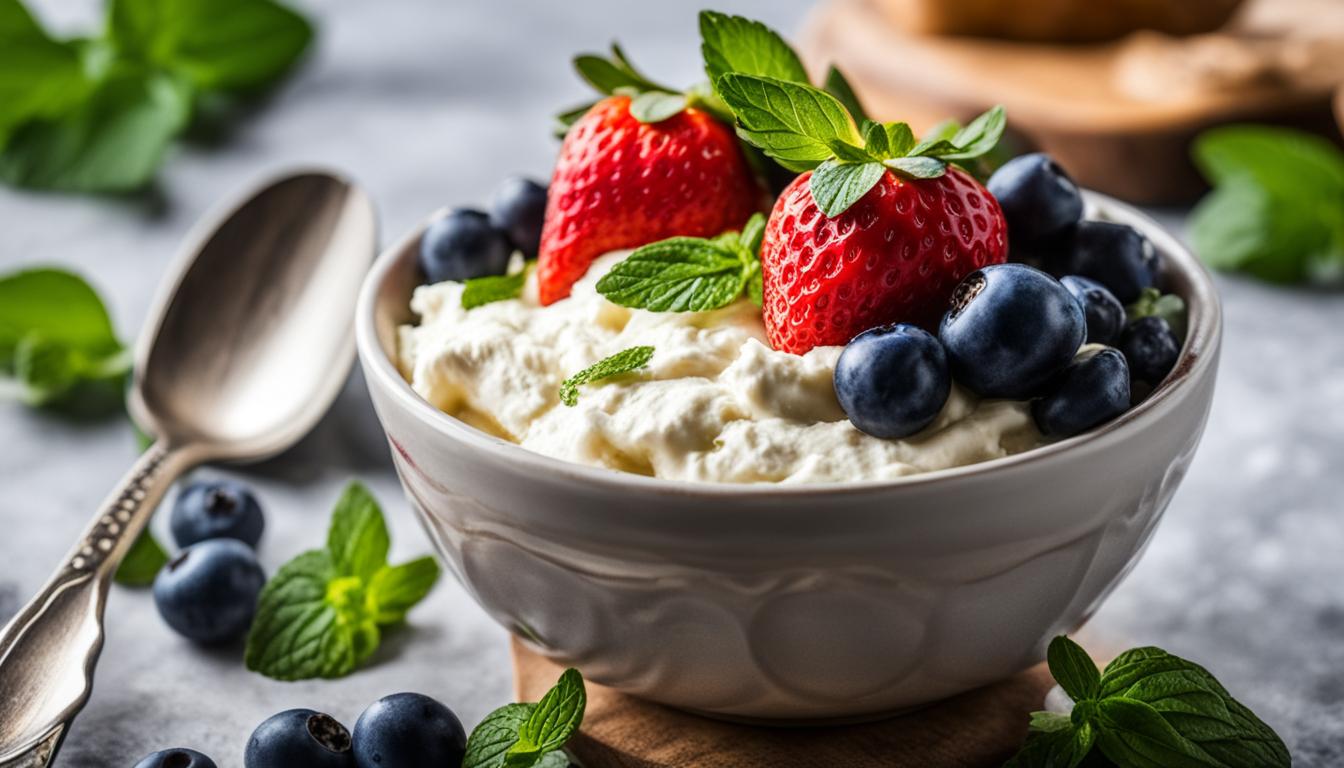When it comes to ricotta cheese, many people wonder if it’s safe to eat it raw. The creamy and delicious cheese is a staple in many dishes, but can it be enjoyed straight from the container without any further processing? Let’s uncover the truth.
Ricotta cheese can indeed be safely eaten raw. Made from heated milk that undergoes coagulation to separate the curd, ricotta cheese is a versatile ingredient that can be enjoyed in a variety of ways. Whether it’s used in pancakes, cheesecakes, or gelato, the raw form of ricotta cheese offers a unique and delightful taste.
Comparable to cottage cheese, which is also safe to consume raw, ricotta cheese differs in terms of texture, taste, and nutrient content. Ricotta cheese is sweeter and has higher fat and calcium content, adding to its overall appeal.
Key Takeaways:
- Ricotta cheese can be safely eaten raw straight from the container.
- Raw ricotta cheese is delicious and can be used in various recipes.
- It is similar to cottage cheese in terms of being safe for raw consumption.
- Ricotta cheese has a sweeter taste and higher fat and calcium content compared to cottage cheese.
Is It Safe to Eat Raw Ricotta Cheese?
Eating ricotta cheese straight from the container does not pose any health risks unless the cheese is contaminated with harmful microorganisms such as listeria monocytogenes. Contaminated cheese can cause illness, including fever, vomiting, and diarrhea. However, properly refrigerated ricotta cheese that is handled and stored correctly can last up to two weeks without spoiling. It is important to be mindful of proper hygiene practices and avoid cross-contamination to prevent the growth of bacteria on the cheese.
When consuming raw ricotta cheese, it is crucial to consider the source and quality of the product. It is advisable to purchase ricotta cheese from reputable brands or producers that prioritize food safety in their production processes. Additionally, checking the expiration date and inspecting the cheese for any signs of spoilage, such as an off smell or mold, is essential to ensure its safety for consumption.
| Safe Handling Practices for Raw Ricotta Cheese |
|---|
| 1. Store ricotta cheese in the refrigerator at a temperature below 40°F (4°C). |
| 2. Keep ricotta cheese in a sealed container to prevent contamination. |
| 3. Use clean utensils or hands when scooping or serving ricotta cheese. |
| 4. Avoid touching the cheese with unwashed hands to prevent bacterial transfer. |
| 5. Do not consume ricotta cheese that has been left at room temperature for an extended period. |
In summary, while it is generally safe to eat raw ricotta cheese, caution must be exercised to ensure its quality and prevent any potential health risks. By following proper handling practices and sourcing the cheese from reputable sources, individuals can enjoy the rich and creamy flavor of raw ricotta cheese without compromising their well-being.
The Debate: Raw Milk Cheese vs Pasteurized Cheese
When it comes to cheese, there is a longstanding debate between raw milk cheese and pasteurized cheese. Each side has its own pros and cons, and the choice ultimately depends on personal preferences and priorities. Let’s take a closer look at the arguments for and against pasteurization in cheese-making.
Pros and Cons of Pasteurization
Pasteurization, a process that involves heating milk to kill harmful bacteria, has been widely adopted in the cheese industry for food safety reasons. One of the main advantages of pasteurized cheese is its reduced risk of bacterial contamination, which can lead to foodborne illnesses. This is particularly important for vulnerable populations, such as pregnant women and individuals with weakened immune systems.
However, pasteurization also has its drawbacks. The heat treatment destroys both harmful and beneficial bacteria, yeasts, and molds present in raw milk. These beneficial microorganisms contribute to the unique flavors and textures found in raw milk cheese. As a result, pasteurized cheese may lack the complexity and diversity of flavors that raw milk cheese offers.
Furthermore, proponents of raw milk cheese argue that proper milk handling and cheese-making procedures, along with sanitary conditions, can ensure the safety of raw milk cheese. They believe that the natural protective factors present in raw milk cheese, such as the aging process, can help mitigate the risks associated with consuming unpasteurized cheese.
Raw milk cheese enthusiasts argue that the flavor and character of traditional cheese can only be truly experienced through the consumption of raw milk cheese. They believe that pasteurization compromises the integrity and authenticity of cheese, reducing it to a standardized product devoid of individuality.
In summary, the debate between raw milk cheese and pasteurized cheese revolves around the benefits and drawbacks of pasteurization. While pasteurization ensures food safety by eliminating harmful bacteria, it also eliminates the beneficial microorganisms that contribute to the unique flavors of cheese. The choice between raw milk cheese and pasteurized cheese ultimately comes down to personal taste preferences and considerations for food safety.
| Raw Milk Cheese | Pasteurized Cheese |
|---|---|
| Rich and complex flavors | Consistent flavors and textures |
| Potential health risks | Reduced risk of bacterial contamination |
| Preserves traditional cheese-making practices | Ensures food safety standards |
The Safety of Raw Milk Cheese
When it comes to consuming raw milk cheese, concerns about safety often arise. However, it is important to note that raw milk cheese has been consumed for centuries, particularly in France, without widespread outbreaks of bacterial diseases. While there are risks associated with consuming raw milk cheese, these risks can be minimized by sourcing milk from clean and healthy animals and ensuring proper sanitation during the cheese-making process.
Outbreaks of bacterial diseases from raw milk cheese are rare, and it is worth noting that the spread of bacteria can occur even with pasteurized cheese. It is crucial to understand that the aging process of raw milk cheese can naturally protect against certain bacteria after a certain period of time. This is why many traditional raw milk cheeses are aged for an extended period, allowing for the development of unique flavors and the reduction of potential health risks.
While the safety of raw milk cheese is a topic of debate, it is important to make informed choices when consuming cheese. By considering the potential risks and following proper hygiene practices, such as purchasing from reputable producers and ensuring proper handling and storage, individuals can enjoy raw milk cheese safely and responsibly.
The Benefits of Raw Milk Cheese
Raw milk cheese offers a range of unique flavors and textures that cannot be replicated in pasteurized cheeses. The presence of beneficial microorganisms in raw milk contributes to the complex flavors and distinct characteristics of these cheeses. Additionally, raw milk cheese often retains higher levels of nutrients, such as vitamins and minerals, due to the minimal processing it undergoes.
| Advantages of Raw Milk Cheese | Advantages of Pasteurized Cheese |
|---|---|
|
|
“Raw milk cheese offers a truly authentic taste experience due to the presence of beneficial microorganisms that contribute to its unique flavors and textures.” – Cheese enthusiast
The Debate in France: Unpasteurized Cheese vs Pasteurized Cheese
In France, the controversy over raw milk cheese has sparked a long-standing debate between proponents of traditional unpasteurized cheese and those concerned about food safety. Cheese-makers in France fiercely defend their right to produce raw milk cheese, arguing that it is an integral part of their cultural and culinary heritage. The French have a deep appreciation for the unique flavors and complexities that raw milk cheese offers. However, food safety authorities have raised concerns about the potential health risks associated with consuming unpasteurized cheese.
“Raw milk cheese is a traditional product that should be preserved, as it embodies the true essence of our culinary traditions. The complex flavors and intense aroma cannot be replicated in pasteurized cheese. It’s a true gastronomic experience,” says Antoine Dupont, a French cheese-maker.
Despite the controversies, outbreaks of bacterial diseases from raw milk cheese have been rare in France. This can be attributed to the stringent regulations and quality controls in place within the French cheese-making industry. However, the debate continues as food safety authorities remain vigilant in their efforts to protect consumers.
Ultimately, the decision to consume unpasteurized cheese or opt for pasteurized cheese rests with the individual. It is important to consider personal preferences, along with the potential health risks associated with consuming raw milk cheese. Regardless of the choice, it is crucial to source cheese from reputable producers and prioritize proper handling and storage practices to ensure food safety.

Considerations for Cheese Consumption
- Food Safety: Prioritize food safety, particularly for vulnerable populations such as pregnant women.
- Taste and Complexity: Raw milk cheese offers unique flavors and a range of textures that come from traditional cheese-making methods.
- Producer Reputation: Ensure that raw milk cheese is sourced from reputable producers who follow proper handling, sanitation, and storage practices.
- Personal Preferences: Consider your own taste preferences and the diversity of flavors you seek in cheese.
Conclusion
In conclusion, eating raw ricotta cheese is not only safe but also delicious. It can be enjoyed straight from the container or used in various recipes to add a creamy and flavorful touch. Similar to cottage cheese, raw ricotta cheese offers a unique texture and taste, with higher fat and calcium content.
When it comes to the safety of raw milk cheese, there are debates surrounding the use of unpasteurized milk in cheese production. While pasteurization ensures food safety by eliminating harmful bacteria, it also removes beneficial microorganisms that contribute to the complexity and flavor of cheese. The decision to consume raw milk cheese or pasteurized cheese ultimately depends on personal preferences and considerations for food safety.
To minimize the risks associated with consuming raw milk cheese, it is important to source it from reputable producers and practice proper handling, sanitation, and storage. By following these guidelines, you can safely enjoy the rich and diverse flavors of raw milk cheese. However, for vulnerable populations such as pregnant women, it is advisable to prioritize food safety and opt for pasteurized cheese.
Whether you choose to indulge in the raw goodness of ricotta cheese or opt for the safety of pasteurized cheese, remember to make informed choices and prioritize hygiene practices. After all, the joy of cheese lies in savoring its distinct flavors while ensuring your well-being.
FAQ
Can I eat ricotta cheese raw?
Yes, ricotta cheese can be safely eaten raw straight from the container without any further processing.
Are there any health risks associated with eating raw ricotta cheese?
Eating raw ricotta cheese does not pose any health risks unless the cheese is contaminated with harmful microorganisms such as listeria monocytogenes.
How long can refrigerated ricotta cheese last without spoiling?
Properly refrigerated ricotta cheese that is handled and stored correctly can last up to two weeks without spoiling.
What is the difference between ricotta cheese and cottage cheese?
Ricotta cheese is sweeter and has a higher fat and calcium content compared to cottage cheese.
Is it necessary to pasteurize cheese for food safety?
Pasteurization plays a crucial role in ensuring food safety in cheese-making by eliminating harmful bacteria that can cause diseases such as listeriosis, typhoid fever, and tuberculosis.
What are the benefits of raw milk cheese?
Raw milk cheese is known for its rich, complex flavors that are a result of the presence of beneficial microorganisms not found in pasteurized cheese.
Can raw milk cheese be consumed safely?
If sourced from reputable producers and handled and stored properly, raw milk cheese can be enjoyed safely.
What is the debate surrounding raw milk cheese in France?
Cheese-makers in France have fought to defend their right to produce raw milk cheese, arguing that it is a traditional product that should be preserved.

